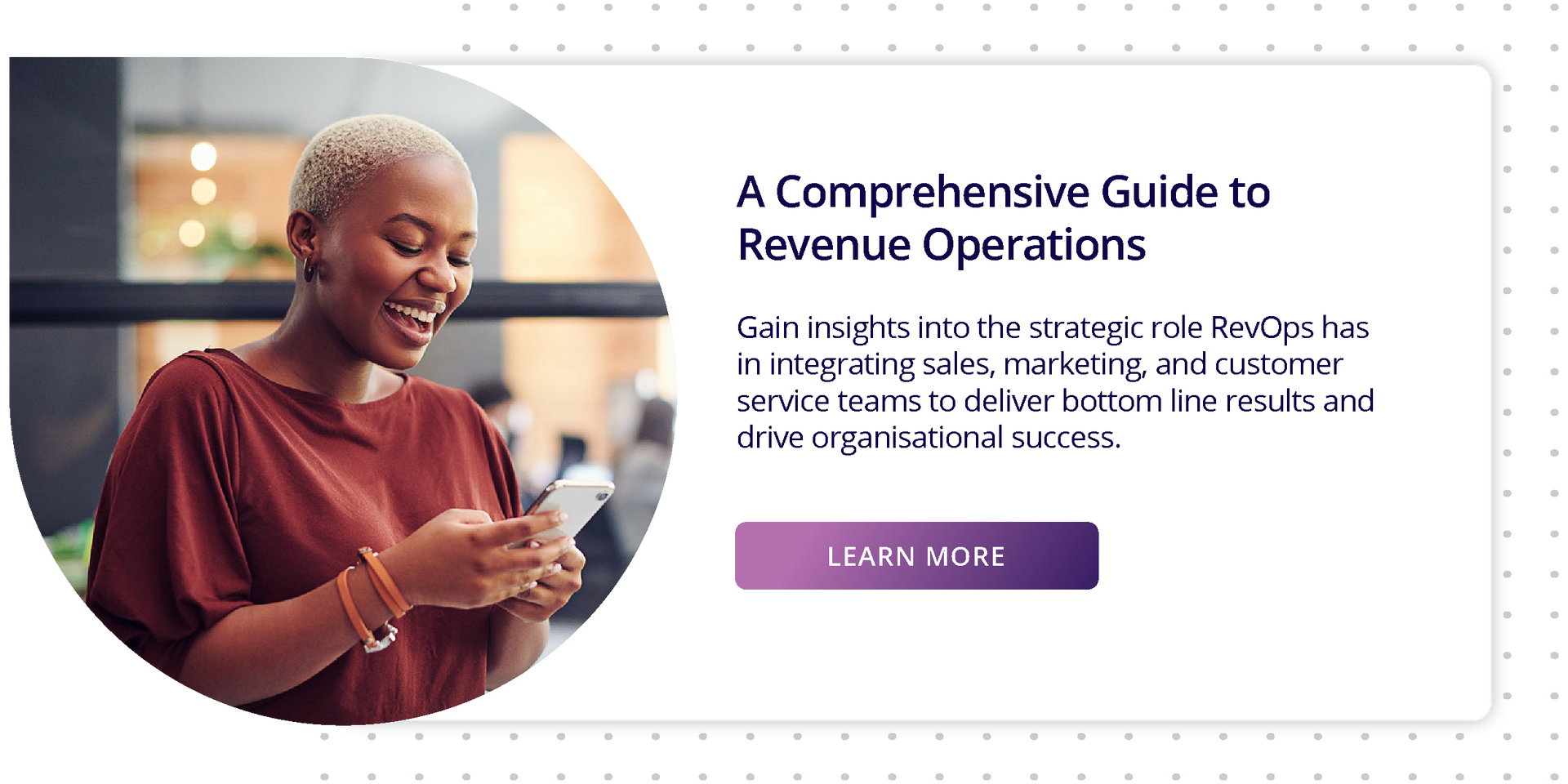What is Revenue Intelligence?
Sales management

Making an Impact with Revenue Intelligence
Revenue intelligence is the process of gathering, analysing, and interpreting sales data to make informed business decisions. It is a subset of revenue operations (RevOps) that uses data and artificial intelligence (AI) to integrate insights across sales, marketing, and customer success (CS) initiatives.
Integrating data into a unified system allows RevOps teams to drive effective collaboration and consistent revenue growth, optimise their strategies, and make better decisions. Use the following guide to prime your organisation for sustained growth and profitability with revenue intelligence.
Key Components of Revenue Intelligence
Revenue intelligence collects, integrates, and measures the information generated by everyday business activities.
Data integration gives RevOps teams access to accurate information in real time – allowing for greater transparency, communication, and collaboration. By collecting and analysing disparate data through an integrated platform, such as a customer relationship management (CRM) system, teams can access a holistic view of the customer journey at any time.
From there, the data can be mined for insights. By leveraging AI-driven predictive analytics tools, sales reps can prioritise their efforts, marketers can optimise their content, and customer success managers can engage more effectively with customers.
RevOps teams rely on predefined performance metrics and key performance indicators (KPIs) to determine whether their efforts work toward broader business goals. They monitor these metrics to gain a clear picture of sales performance, understand what’s working, and identify areas for improvement. Examples of KPIs include lead conversion rates, sales cycle length, and customer lifetime value (CLV).
Revenue Intelligence Benefits
Implementing revenue intelligence can enhance an organisation’s sales and marketing efforts and strategically drive revenue growth. By leveraging AI and data-driven insights, they can optimise RevOps in several key ways:
- Enhanced Sales Efficiency: Sales reps have the tools to focus their time and resources on the most promising prospects where they are most likely to achieve success.
- Improved Decision-Making: Sales leaders use real-time insights and predictive analytics to understand at-risk deals, prioritise opportunities, and allocate resources.
- Cross-Functional Collaboration: Marketers analyse leads to better understand campaign performance and sales teams leverage marketing insights to refine their approach.
- Increased Accuracy in Forecasting: Predictive analytics forecasts sales performance, allowing organisations to plan more effectively and set realistic targets.
- Proactive Risk Management: Revenue intelligence tools monitor deal progression and customer interactions, highlighting red flags and improving sales teams’ chances of closing deals successfully.
- Enhanced Customer Engagement: CS teams analyse past interactions and behaviours to generate more meaningful customer interactions and higher engagement rates.
By integrating revenue intelligence into their operations, companies can unlock these benefits – driving more efficient, effective, and profitable sales processes.
Revenue Intelligence Tools
The bulk of revenue intelligence work is enabled by various RevOps tools and technologies. These tools are useful in enhancing data integration, providing actionable insights, and driving revenue more efficiently. They include:
- CRM-integrated tools provide real-time insights and actionable data directly within the CRM dashboard.
- Standalone revenue intelligence platforms offer comprehensive features like predictive analytics, deal insights, and performance tracking.
- AI-powered analytics tools analyse data and provide predictive insights, advanced buying signals, and next-best-action recommendations.
- Collaboration and integration tools integrate data from multiple departments to provide a unified view of customer interactions.
- Customer success-focused tools provide insights into customer behaviour and identify upselling opportunities.
Choosing the right revenue intelligence platform is crucial for maximising the benefits for your organisation. Start by identifying any specific issues you want to solve, which can clarify necessary features and functionalities. From there, evaluate user requirements and integration with existing RevOps tools to ensure seamless integration and adoption. Lastly, summarise the outcomes you expect from the platform and evaluate how it will fit within existing workflows.
Explore Tools for Revenue Intelligence in Your Organisation
Businesses that embrace revenue intelligence can enhance their sales processes, build stronger customer relationships, and achieve sustained growth and profitability in an evolving marketplace.
Richardson provides several tools and services to support these efforts, including:
- Accelerate™ Sales Performance System to help sales teams connect selling behaviours to the performance metrics they impact and improve strategies.
- Consulting services to help organisations integrate data and optimise sales processes to ensure seamless collaboration across teams.
- Training programmes that leverage data-driven insights that help sales reps engage more effectively with customers.
The Future of Revenue Intelligence
As companies prioritise activity capture across multiple channels, revenue intelligence will have to become more competitive, efficient, strategic, and customer-centric.
For more accurate insights and better decision-making, RevOps teams can leverage advanced data capture, which gathers comprehensive data from various customer interactions and enables a deeper understanding of customer behaviours.
Teams should continually explore and identify useful AI and machine learning (ML) tools for identifying patterns, predicting outcomes, and recommending actions. These can further personalise customer interactions, optimise revenue strategies, and forecast sales with greater precision. For example, sales teams can use AI-driven platforms to analyse conversation data and provide real-time coaching feedback to sales reps, improving performance and customer engagement.
Advanced analytics capabilities, such as predictive and prescriptive analytics, will also shape the future of revenue intelligence. These approaches focus on future sales trends and customer behaviours to provide actionable recommendations for further optimising sales strategies.
By leveraging advanced data capture and AI, organisations can continue to transform sales processes well into the future. Staying on the forefront of these developments will enable businesses to anticipate market changes and proactively adapt their strategies.

White Paper: From Insight to Impact - Harnessing Behaviour Analytics for Sales Growth
Learn how to harness behaviour analytics for sales growth by overcoming the challenge of connecting sales performance metrics to specific behaviours.
DownloadGet industry insights and stay up to date, subscribe to our newsletter.
Joining our community gives you access to weekly thought leadership to help guide your planning for a training initiative, inform your sales strategy, and most importantly, improve your team's performance.











